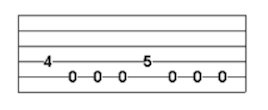How To Play Cool Sounding Guitar Riffs
Do your single note phrases on the guitar sound good to you? By that, I mean are all the notes clear, crisp and powerful when you want them to be? Is it difficult for you to move your pick hand back and forth from string to string when playing without getting lost? Is it hard for you to memorize melodies and phrases on the guitar?
Most beginning guitar players suffer from all of these problems—they don’t have a sense of control and power in their pick hand. Their single note picking is weak and they have the feeling that their hand is getting lost in the strings as they practice.
The consequences of poor pick hand control are many:
- Lack of consistent tone—their notes don’t have clarity and definition
- Their riffs and phrases aren’t polished sounding and smooth
- Unable to memorize things on the guitar
- Pick hand and fret hand don’t play the same correct notes at the right time
- They waste time practicing things that will not help them eliminate their pick and fret hand problems
I suffered from these same problems as a beginning guitar player—so did many of my students. There is a solution: Two String Guitar Riff Practice.
Practicing two string riffs will enable you to:
- Build consistency in your sound
- Coordinate your hands
- Learn a system for memorizing guitar parts
- Help you learn to practice in a simple, fun way
- Learn to sound like awesome on the guitar!
Two String Riff Practice
A guitar riff is a short musical phrase that is usually repeated in a song. In this lesson we are going to use a short two string riff to work on building your technique, hand coordination and memorization skills in a way that is fun and sounds cool.
Here is the entire riff:

Listen to the riff played at normal speed here.
Listen to the riff played slower here.
Let’s start by looking at just the first measure (the first eight notes.) The best way to learn and memorize new riffs and phrases is to break them down into small parts. Here is just the first measure:

Listen to the first measure of the riff here.
Notice that there are two groups of four notes for the pick hand. The picking pattern plays one note on the fourth string followed by three notes on the fifth string. Practice playing just the first four notes until your pick hand is comfortable playing this repeating pattern. Start with a downstroke on the fourth string followed by an upstroke on the fifth, then another downstroke and upstroke on the fifth string. This picking pattern is repeated throughout the entire two string riff. Practice playing it slowly using a consistent picking pattern—do not move on with the next notes of the riff until the pick hand can play this four note sequence consistently, cleanly and clearly.
For the fret hand, play the seventh fret note using your ring finger and the fifth fret note using your index finger. Practice playing just the first measure making sure that your pick and fret hands are synchronized—all notes need to sound clear and distinct. Make sure that you can play the first eight notes from memory before moving on to the second measure.
Here is measure number two:

Listen to the second measure of the riff here.
Notice that the picking pattern we used in measure one is exactly the same in measure two. As for the fret hand, use your index finger to play the fourth fret note and your middle finger to play the fifth fret note. Practice this measure just like the first—make sure that you can play it from memory.
Once it is memorized, combine it with the first measure—play both of them while focusing on picking the notes clearly and crisply:

Listen to the first and second measures of the riff here.
Practice the final two measures in the same manner. Remember to memorize the final measures the same way—one small part at a time. Memorizing the phrases is the key to building speed and a fluid sound into the guitar riff. Rock, blues and country guitar players don’t use sheet music or tablature on stage—everything is memorized. The more that you work on your memorization skills, the easier it will be for you to learn, retain and play songs from memory. Memorization is a learned skill just like developing your pick and fret hand technique, so you will want to work memorization into your practice routine along with your other music skills.
Get fun and effective beginner guitar lessons online
